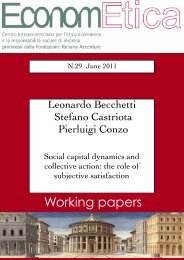WP15 November 2009 - Econometica
WP15 November 2009 - Econometica
WP15 November 2009 - Econometica
Create successful ePaper yourself
Turn your PDF publications into a flip-book with our unique Google optimized e-Paper software.
We resume our main findings from Table 2 as follows:<br />
i) A significant part of players endorse team reasoning, even though, as a whole, individual<br />
rationality is more widespread than we-rationality<br />
If we do not consider the possibility of “strategic” belief (given the possibility of getting the<br />
prize for the belief even in case of a +/- 10 error, players may declare a belief of 190 (30) even<br />
though their true belief is equal to 200 (30)) data show that 52 players (37.14% of the total sample)<br />
endorsed I-rationality and 15 players (10.71%) endorsed we-rationality by choosing C i = C = B<br />
(the number of players who endorsed we-rationality by choosing C i = C = B increases to 28<br />
(20.00%) if we consider “strategic” belief).<br />
We also note that only 3 players chose the minimum bid and 35 chose the maximum one. In<br />
particular, note that only one player followed recursive reasoning believing that the counterpart<br />
knows or acts according to it (i.e. there is only one player who declares the minimum believing that<br />
her counterpart was doing the same).<br />
ii) The undercutting choice largely prevails over we-rationality choice when the expectation on<br />
the counterpart choice is not the upper bound one: This supports the idea that the common<br />
reason to believe works well within the theory of team reasoning.<br />
For B i(j) < B , we find that cases in which C i



